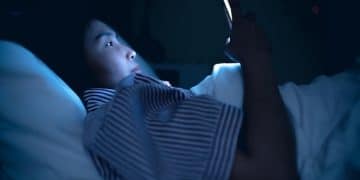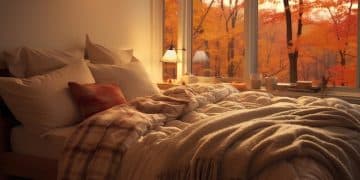New Study: Understanding Blue Light’s Impact on Sleep and Protection Methods
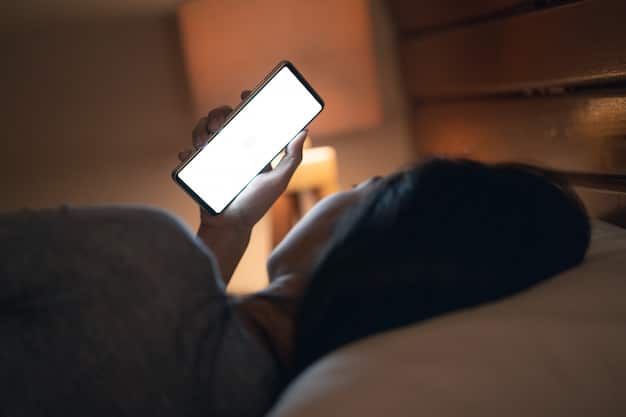
New Study: The Impact of Blue Light on Sleep and How to Protect Yourself explores how blue light exposure, particularly from screens, affects sleep patterns and offers practical strategies for mitigating its negative effects. This research highlights the importance of managing screen time and utilizing tools like blue light filters to improve sleep quality.
New Study: The Impact of Blue Light on Sleep and How to Protect Yourself is a growing concern in our digitally connected world. With increased screen time, understanding how blue light affects our sleep is crucial. But what exactly does this light do to our sleep cycle, and what can we do to protect ourselves?
New Study on The Impact of Blue Light on Sleep and How to Protect Yourself
The digital age has brought countless benefits, but it has also introduced new challenges to our health, particularly concerning sleep. New Study: The Impact of Blue Light on Sleep and How to Protect Yourself is becoming increasingly relevant as more people spend significant time in front of screens. Understanding this impact and implementing protective measures is key to maintaining healthy sleep patterns.
Blue light, a high-energy visible light, is emitted by various digital devices, including smartphones, tablets, laptops, and TVs. While exposure to blue light during the day can boost alertness and mood, excessive exposure in the evening can disrupt our body’s natural sleep-wake cycle. This disruption can lead to difficulties falling asleep, reduced sleep quality, and potential long-term health issues.
Keep reading as we delve into the specifics of what the research reveals, as well as provide practical recommendations to improve both sleep and well-being.
Conclusion of this section: Understanding the pervasive impact of blue light on our sleep patterns, as highlighted by the findings from New Study: The Impact of Blue Light on Sleep and How to Protect Yourself, allows us to develop strategies to mitigate these effects and maintain a healthy lifestyle.
How Blue Light Affects Your Sleep
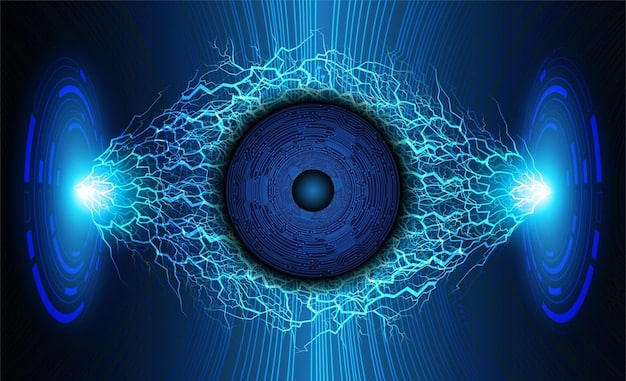
Blue light has a unique ability to suppress the production of melatonin, a hormone crucial for regulating sleep. The new research indicates that there are further consequences to blue light exposure that have yet to be fully examined and understood.
Melatonin helps signal to our body that it’s time to wind down and prepare for sleep. When blue light interferes with this process, it can delay the onset of sleep and reduce the overall quality of rest. The study offers some practical options, outlined below.
The Science Behind Blue Light and Melatonin
The new study helps to better explain how blue light affects melatonin levels. Specialized cells in the retina are particularly sensitive to blue light. When these cells detect blue light, they send signals to the brain that inhibit melatonin production. This inhibition is particularly pronounced in the evening, when our bodies naturally begin to produce more melatonin to prepare for sleep.
Consequences of Melatonin Suppression
- Delayed Sleep Onset: Reduced melatonin levels can make it harder to fall asleep, leading to delayed sleep onset.
- Reduced Sleep Quality: Even if you fall asleep at a reasonable time, the quality of your sleep may be compromised.
- Increased Daytime Fatigue: Poor sleep quality can lead to increased fatigue and reduced alertness during the day.
- Long-Term Health Risks: Chronic sleep disruption has been linked to various health issues, including obesity, diabetes, and cardiovascular problems.
Conclusion of this section: By understanding the scientific processes through which blue light interferes with melatonin production and disrupts the natural sleep-wake cycle, we can take proactive steps to protect our sleep.
Practical Strategies to Minimize Blue Light Exposure
The key to protecting our sleep from the adverse effects of blue light lies in implementing strategies to minimize exposure, especially in the hours leading up to bedtime. Here are some actionable steps you can take.
From the New Study: The Impact of Blue Light on Sleep and How to Protect Yourself we now can suggest the following:
Use Blue Light Filters
We are seeing more apps and devices include blue light filters that can be enabled to reduce the amount of this harmful light emitted.
- Night Shift Mode: Many smartphones and tablets have built-in night shift modes that automatically shift the display to warmer colors in the evening.
- Blue Light Blocking Apps: Several apps are available for computers and laptops that filter out blue light.
- Blue Light Blocking Glasses: These glasses have lenses that filter out blue light, making them ideal for use when working on digital devices in the evening.
Adjust Screen Settings
Adjusting your screen settings can also help reduce blue light exposure, as suggested in the New Study: The Impact of Blue Light on Sleep and How to Protect Yourself.
- Reduce Brightness: Lowering the brightness of your screens can reduce the intensity of blue light.
- Use Dark Mode: Many apps and operating systems offer dark mode options that reduce the amount of blue light emitted.
Conclusion of this section: By integrating these practical strategies such as using blue light filters and adjusting screen settings into your daily routine, you can significantly mitigate the negative impacts of blue light on sleep.
The Importance of Limiting Screen Time Before Bed
Minimizing your exposure to screens before bed is one of the most effective ways to protect your sleep. The New Study: The Impact of Blue Light on Sleep and How to Protect Yourself shows a direct corrilation between screen time and overall health.
The less time you spend in front of screens, especially in the evening, the better your chances of enjoying a restful night’s sleep. This reduction is especially helpful for younger users.
Create a Screen-Free Evening Routine
If you create a routine that encourages the dimming of the digital glow the body will have an easier time transitioning.
- Set a Cut-Off Time: Establish a specific time each evening when you turn off all electronic devices.
- Wind-Down Activities: Engage in relaxing activities that don’t involve screens, such as reading, listening to music, or taking a warm bath.
- Optimize Your Sleep Environment: Make sure your bedroom is dark, quiet, and cool to promote better sleep.
Alternative Bedtime Activities
Replacing screen time with alternative activities can also help improve your sleep, and help the brain shift from a state of information collection to one of calm.
- Reading a Physical Book: Reading a book can be a great way to wind down before bed.
- Meditation or Deep Breathing Exercises: These practices can help calm your mind and prepare your body for sleep.
- Light Stretching or Yoga: Gentle physical activity can also promote relaxation and improve sleep quality.
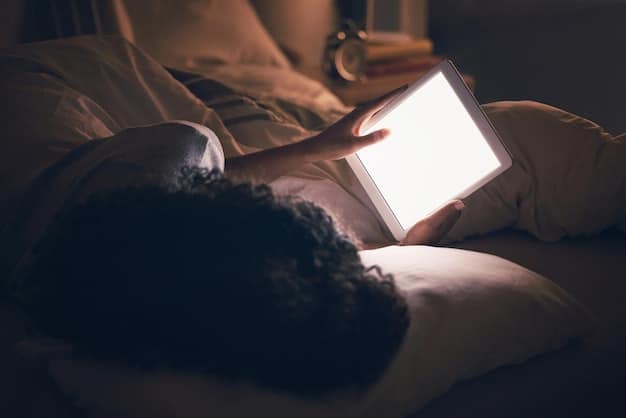
Conclusion of this section: By limiting screen time before bed and replacing it with alternative, screen-free activities, you can create a more conducive environment for restful sleep, minimizing the disruptive effects of blue light.
Creating a Sleep-Friendly Environment
In addition to managing blue light exposure, creating a sleep-friendly environment is crucial for promoting better sleep quality. A well-prepared sleep environment can significantly enhance your ability to relax and fall asleep easily, regardless of external factors.
The new study shows that these practices are just as important mitigating blue light exposure to the users overall happiness.
Optimize Your Bedroom
Ensuring your bedroom is conducive to sleep can make a significant difference to the overall quality of sleep.
- Darkness: Use blackout curtains or blinds to block out external light.
- Quiet: Use earplugs or a white noise machine to minimize disturbances.
- Cool: Set your thermostat to a comfortable temperature, typically between 60-67°F (15-19°C).
Develop a Relaxing Bedtime Routine
Establishing a consistent bedtime routine can signal to your body that it’s time to wind down and prepare for sleep.
- Consistent Sleep Schedule: Go to bed and wake up at the same time every day, even on weekends.
- Avoid Caffeine and Alcohol: Refrain from consuming caffeine and alcohol close to bedtime.
- Take a Warm Bath or Shower: A warm bath or shower can help relax your muscles and promote sleep.
Conclusion of this section: By optimizing your bedroom environment and developing a consistent, relaxing bedtime routine, you can create a more conducive setting for restful sleep, complementing the strategies for managing blue light exposure.
Further Research on The Impact of Blue Light on Sleep and How to Protect Yourself
The new study shows only a snapshot of the overall consequences of blue light, and the methods that you can use to reduce the effects of blue light, further research that examines those implications is still important.
The study shows that while filters and glasses can help, it is important to set hard limits, especially for younger users. The best way to promote a good nights rests, is to limit screen time before bed.
For more information related to additional health and lifestyle tips, please be sure to follow and subscribe. This article will be updated as further research on the topic becomes available. The study is ongoing, as the overall reach of the effects become better understood.
| Key Finding | Brief Description |
|---|---|
| 💡 Blue Light’s Impact | Suppresses melatonin, disrupting sleep. New study confirms this connection. |
| 📱 Minimize Exposure | Use filters, reduce screen time before bed for better sleep. |
| 🌙 Sleep Environment | Optimize bedroom (dark, quiet, cool) and set a routine. |
| 👓 Protective Tools | Blue light glasses, night modes, and apps help filter harmful light. |
Frequently Asked Questions
Blue light is a high-energy visible light emitted by digital screens. According to the New Study: The Impact of Blue Light on Sleep and How to Protect Yourself, it suppresses melatonin.
Blue light filters work by blocking or reducing the amount of blue light emitted from digital devices, helping to minimize its impact on melatonin production and improve sleep.
In general, children can be more susceptible to the negative effects of blue light. It is beneficial to limit them and yourself to make sure that sleeping schedule is not impacted by The Impact of Blue Light on Sleep
Winding down from a long day can be extremely helpful and can include things like reading a physical book, meditating, or taking a warm bath or shower.
While results vary, combining blue light management with good sleep hygiene practices sets the stage for better sleep. The New Study: The Impact of Blue Light on Sleep and How to Protect Yourself clearly states the value.
Conclusion
Managing blue light exposure is essential for maintaining healthy sleep patterns in our digital age. By implementing the strategies discussed, such as using blue light filters, limiting screen time before bed, and creating a sleep-friendly environment, you can protect your sleep and improve your overall well-being.
As highlighted in New Study: The Impact of Blue Light on Sleep and How to Protect Yourself, it is important to continue doing more research in this area and making the public aware of the effect of overexposure.
